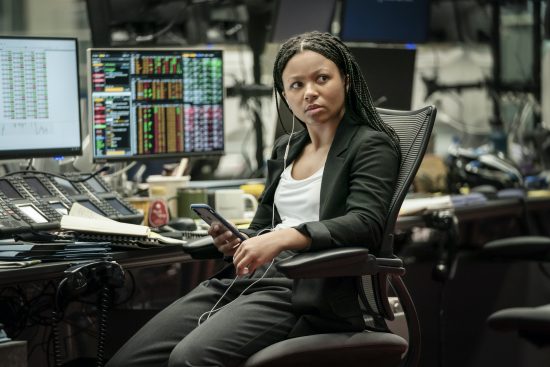LFF 2020 Review: Industry – “A show with plenty to say”
In high finance, some things never change, or do they? Maybe the secret to change is to refocus for the modern day. Billions has cornered this market…for the older white guy, but what about Gen Z? Here to move the needle comes a glossy new TV series: Industry. With the increasing dominance of TV over film and a shared setting, early episodes of Industry debuted at the London Film Festival. The show will be released on BBC Two in the UK and HBO in the US later in 2020.
The twist in this series comes threefold: Wall Street has been replaced by Bank, London, our primary protagonist is a woman, and she must navigate the hierarchical banking system and the British class system in pursuit of her dreams. Beyond this, Industry’s USP is a pilot episode directed by Lena Dunham. The pilot is more serious than Dunham’s previous work, yet episode 1 begins with scenes eliciting typical Dunham discomfort, where key cast members endure awkward panel interviews to secure a coveted graduate scheme place at a top UK finance house.
Industry isn’t Emily in Paris, it’s Harper in London. Myha’la Herrold plays Harper, a mysterious American grad and a WOC with snaggleteeth crossing the Atlantic for her career. Harper’s back story is a mystery, but the series hints at secrets she doesn’t want revealed. Herrold shares the screen with key players all ready to breakout (notably, Marisa Abela, Conor MacNeill and David Jonsson) as the series charts their ups and downs, pitted against one another to secure a permanent role. The only real familiar face is Ken Leung as Harper’s mentor, and he’s great in every scene.
Dunham nails workplace culture, including how those in power use stock phrases that feel supportive, but are actually designed to placate those deemed inferior, like “Don’t apologise” and “Don’t overthink it” while showing that Harper sees through it all. Industry features other Dunham tropes, like plenty of sex (multiple breasts and two, yes two, separate penises briefly on display) and partying, plus some newer additions, like a hell of a lot of befuddling shoptalk. Dunham sets the tone with relish and ends her short tenure with an event that impacts on everyone, while cleverly interlacing diegetic-to-non-diegetic musical interludes.
The second episode is directed by Tinge Krishnan using more grit and humour than Dunham, perhaps because she’s not bound by the weight of character introduction or public expectation. Krishnan widens the focus to include Abela’s Yasmin, a multi-lingual, possibly Iranian grad with a catastrophic personal life, while making sure Harper’s story continues to unfold. Krishnan does a good job.
Both episodes suggest that some stereotypes linger, even if the perpetrators look different. Bankers still shamelessly take drugs, vote Tory and share limitless ambition. Other themes feel regressive, with two gay male characters closeting under the assumption that revealing their preferences would be professional suicide. Also, the very reason why banking is a sought-after career: boatloads of money seems almost incidental to the plot, as if the showrunners find it distasteful. Industry does explore a nice line in victimisation, practically every character has to take power, whether from the system, older male colleagues, or even from female clients. It doesn’t go so far as Euphoria, but it’s boundary-pushing manages not to glamourise the very business Industry wants to hold to account.
What was most interesting, is how different the world already feels from the events shown. Remember shop-bought lunch orders by day and crowded restaurant tables by night? That’s just so 2019!
Industry often sacrifices dynamic cinematography for soapy thrills, but it still has plenty to say.










